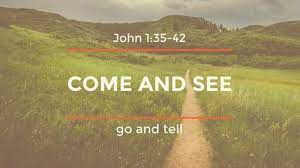The strength of the resurrected life of the Lord Jesus is precisely this: it does not limit itself to freeing us from evil, but ensures that the experience of evil can be transformed into a place in which a greater good is manifested.”
Happy Sunday!
DOCTRINE AND FAITH
(Job 7,1-4.6-7; Psalm 146 (147); 1 Cor 9,16-19.22-23; Mark 1,29-39; 5th Sunday in Ordinary Time; 4th February 2024)
“When will I get up?” (Job 7,4), asks Job, struck by an illness and by such pain that it completely closes his horizon to hope. Mark responds to Job's question with the story of the healing of Peter's mother-in-law: Jesus "came near her and made her stand up, taking her by the hand: her fever left her and she served them" (Mark 1,31). Job's question is somehow transformed: from asking "when will I get up”, to a different question: "who will raise me up?". Then there is a further passage that should not be overlooked: Job evokes a "hard service" that man must perform on earth, like a mercenary who awaits his salary, or a slave who, in his toil, "sighs for the 'shadow' (see Job 7,1-2). Peter's mother-in-law, however, is raised up by Jesus and handed over to a service freed from the harsh constraints of slavery and which already prefigures the dedication of the one who came "not to be served, but to serve and give his life as a ransom" for many" (Mark 10,45). The verb that the evangelist uses to narrate how Jesus makes this sick woman "get up" by taking her by the hand is illuminating (see verse 31). In Greek there is egheiro, one of the two verbs with which the New Testament recounts the resurrection of Jesus, his rising, or rather his being raised from the dust of death. There is already an Easter dawn shining in what is happening in this humble place of Capernaum. Other small elements of the story make it shine through. As soon as Jesus entered this house, "immediately they told him about her" (1,30). Jesus enters “immediately” (v. 29) and “immediately” they inform him of this sick woman. Time continues to prove to be "short" because the Kingdom is near and brings our days to completion (see Mark 1,15).
In this speaking to him about her we can see an initial form of intercession. Peter and his companions were present in the synagogue and they too, like the crowds, were surprised and amazed by the authority with which Jesus drove out the impure spirit and now they hope that he can also do something for this sick woman. However, we can understand something else in their words. They also talk to him about her and her illness to justify themselves. They are welcoming an important guest into their home, an authoritative rabbi, different from all the other scribes and teachers, but they cannot do it adequately, as they would like and as the guest deserves, because there is a sick person in the house, and more so a woman, on whom the burdens of hospitality weighed more heavily. Here then the Easter logic manifests itself, which transfigures the limit into grace, the obstacle into opportunity, and a tomb of death into a womb of life. Pino Stancari comments:
In the house of men, Jesus' passage reveals how the very presence of a creature, which was considered the cause of general discomfort, instead constitutes the foundation on which a reconciled building can be built. “The fever left her and she began to serve them”. Previously, in the same chapter, Jesus had been "served by angels" (1,13); now it is the diakonia expressed by that sick woman (who was considered by everyone as an impediment) to make the house hospitable, and she to provide the service of welcoming Jesus, an honored guest.
The strength of the resurrected life of the Lord Jesus is precisely this: it does not limit itself to freeing us from evil, but ensures that the experience of evil can be transformed into a place in which a greater good is manifested. She who was sick can now serve the good of Jesus and those with him, in the same way that he who was crucified and rejected by men becomes the cause of salvation for all. The logic of Easter is always that of a stone rejected by the builders which is chosen by God as the cornerstone of his house.
At the end of the Gospel the women, who went to the tomb, will receive this command: "Go, tell his disciples and Peter: "He is going before you to Galilee. You will see him, as he told you” (Mark 16,7). Returning to Galilee also means returning to this house in Capernaum, to learn to recognize the many signs of Easter present in our personal Galilee, that is, in the ordinariness of our days. The Lord truly becomes close to our daily existence and raises us up, transfiguring our life and demonstrating how his grace does not eliminate or erase our limitations and our infirmities, but transforms them, putting them at the service of a greater good. Mark's story ends with the invitation that Jesus addresses to those who seek him, to go "elsewhere" (see Mark 38). Not so much in another place, but in a different attitude with which to relate to our days, to seek him and find him there, in that newness that he gives to our lives. A novelty that conforms us to his own life, making us capable of playing in relationships and situations with that style that Paul reminds the Corinthians today: to become "servant of all" and in this way announce the Gospel by becoming participants in it. On the one hand, we must announce what we live; on the other, what we announce changes our existence, lifting us up from the disease of our individualism to make us "all things to all people" (1 Cor 9,22). +John I. Okoye.



